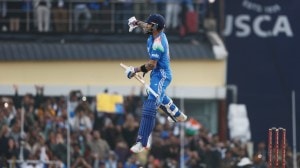Former Cab Sec hints Pranab ministry drafted note against PC
The note sought to suggest that P Chidambaram could have insisted on auction of the 2G spectrum.
Deposing before a Joint Parliamentary Committee (JPC),former Cabinet Secretary K M Chandrasekhar today said that a note dated March 25,2011 on the 2G spectrum originated from the Finance Ministry and was sent to the Prime Ministers Office though the idea had emanated from the Cabinet Secretariat.
The note,prepared when Pranab Mukherjee was heading the Finance Ministry,sought to suggest that P Chidambaram,as Finance Minister,could have insisted on auction of the 2G spectrum.
Chandrasekhar was Cabinet Secretary for four years,from June 2007 to June 2011. The JPC is examining the pricing and allocation of telecom licences between 1998 and 2009 in the backdrop of the 2G spectrum allocation scandal.
Briefing reporters,JPC chairman P C Chacko quoted Chandrasekhar as saying that the intention was to present a holistic picture in a chronological manner so that all wings of the government could form a common view. But the former Cabinet Secretary felt that certain assumptions and points, which were made in the note in addition to facts,could have been avoided.
Chandrasekhar told the JPC that it was not expected that there would be any inputs from the Cabinet Secretariat. I never asked for or saw the note prepared in the matter by the Ministry of Finance since I considered it to be an internal note of that Ministry, he was quoted as having said.
To queries on why Chandrasekhar never got to see a note prepared at his behest,Chacko reiterated what the former bureaucrat had told the panel and maintained that it was not routed through the Cabinet Secretariat and was sent by the Finance Ministry directly to the PMO.
Chandrasekhar said that he had written a note to the Prime Minister on December 4,2007 suggesting that the licence fee for 2G spectrum allocation be enhanced to Rs 35,000 crore. The Prime Minister,according to Chandrasekhar,had asked him to look into the issue of financial implications of the recommendations of the Telecom Regulatory Authority of India (TRAI) over the allocation of 2G Spectrum in the wake of media reports and the letters which he had received.
While responding to him,he made the suggestion for a higher licence fee so that the spectrum could fetch the government more revenue. But Chandrasekhar said it was for the Department of Telecommunications (DoT) to take the call.
He said he had taken in to account various factors like increased tele-density,inflation and increased consumer base. Members tried to draw him out on why his opinion was not accepted. Chandrasekhar responded by saying that the Prime Minister had sought views from other sources also. He maintained that the government was not always guided by revenue considerations. A decision was taken in totality. It was for the government,he said,to decide what was best for common good.
Members drew his attention to the position taken by former Telecom Secretary D S Mathur that he had apprised him (Chandrasekhar) of the differences between him and the then Telecom Minister A Raja about what was going on. Chandrasekhar said it was not so. He said Mathur never mentioned any differences to him and there was no record of his having flagged the issue in his communications to the Cabinet Secretariat.
A total of 12 of the 30 members were present at the meeting. Six members belonging to the BJP remained absent,pressing their demand that the JPC call both the Prime Minister and Chidambaram as witnesses.
Chacko ruled out the possibility of considering the demand for calling the Prime Minister saying it had no precedent. Regarding Chidambaram,he read out a letter written by Lok Sabha Speaker Meira Kumar in response to the reference he had made to her on this count.
The Speaker pointed out to Chacko that the reference was premature and,therefore,did not warrant her intervention. The implication was that the JPC had to first take a decision to call a minister and then seek her consent. We will take up the matter at a later date, Chacko said.


- 01
- 02
- 03
- 04
- 05





























